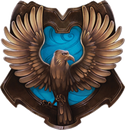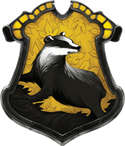GENERAL INFORMATION
▼▼▼▼▼▼▼▼▼▼
Hogwarts School of Witchcraft and Wizardry is the British wizarding school, located in the Highlands of Scotland. It takes students from the United Kingdom of Great Britain and Northern Ireland, and Ireland.
The castle is located in the mountains near a loch. The precise location of the school can never be uncovered because it was rendered Unplottable. To Muggles, the school looks like an old abandoned castle. Similarly, most wizarding schools locations are protected in order to prevent their ways of teaching being revealed, as well as protect the students and schools themselves from any harm.
Established around the 10th century, Hogwarts is considered to be one of the finest magical institutions in the wizarding world, though other notable schools included Beauxbatons Academy of Magic and the Durmstrang Institute. Children with magical abilities are enrolled at birth, and acceptance is confirmed by owl post at age eleven. However, if the child in question is a Muggle-born, a professor from the school would come and inform the child's parents.
The school's motto is Draco Dormiens Nunquam Titillandus, which, translated from Latin, means "Never tickle a sleeping dragon".
HOGWARTS HISTORY AND HOUSES
▼▼▼▼▼▼▼▼▼▼
Over a thousand years ago, the four greatest witches and wizards of the age shared a dream, to create a school where young people of the wizarding world could study and be trained in the magical arts they needed to become skilled, fully-trained wizards. These four great wizards each founded one of the Houses of the school that they worked together to form: Hogwarts School of Witchcraft and Wizardry. They have been referred to as ‘The Hogwarts Four.’
Each of the Founders contributed to the character of not just their houses but the whole school, but it was Helga Hufflepuff who perhaps did more than the others. Hufflepuff was particularly famous for her dexterity at food-related Charms. Many recipes traditionally served at Hogwarts feasts originated with Hufflepuff. She “brought people from different walks of life together to help build Hogwarts and was loved for her charming ways”. Another accomplishment of Hufflepuff’s was her concern for the treatment of House-elves in the Wizarding world. She made Hogwarts a refuge for them, and as a result they were treated more kindly there than elsewhere in the world at that time.
For a number of years, the four founders worked together in harmony. Each of the founders took a group of students to be in their own house and even though they had differences of opinion about who should be trained, the house system helped them all to work together. However, as the years went by, the differences between Gryffindor and Slytherin became a serious rift.
Salazar Slytherin believed that only pure-blood witches and wizards should be allowed to attend Hogwarts. He got into an argument with Godric Gryffindor about this and eventually left the school. There was a legend that Slytherin built a secret chamber somewhere in Hogwarts that only his true heir would be able to open. This chamber, called the Chamber of Secrets, contained a monster that would finish his “noble purpose” of killing all the Muggle-born students at Hogwarts. As Slytherin’s heir, Tom Riddle did open the Chamber and released the monster, a basilisk. Harry Potter defeated the basilisk with the help of Fawkes the phoenix and the sword of Gryffindor.
The school flourished over the centuries which followed. Nearly all witches and wizards in Britain for a thousand years have passed through the school, being taught the skills and control needed to become a fully qualified wizard and the fill a productive role in magical society.
Gryffindor is well known for courage, bravery, daring, nerve, and chivalry. The house colours are deep red and gold, and the house is symbolised by a lion. The entrance to the common room is on the seventh floor hidden behind a portrait of the Fat Lady. In order to get into the common room, Gryffindor students must say the correct password.
Founded by: Godric Gryffindor
House ghost: Sir Nicholas de Mimsy-Porpington, also known as Nearly Headless Nick.Slytherin values ambition, leadership, cunning, determination, and resourcefulness. The house is symbolised by a serpent, and the house colours are green and silver. Its common room is located in the dungeons, underneath the Black Lake, and hidden behind a stone wall. Many people believe students sorted into this house often get involved in the Dark Arts.
Founded by: Salazar Slytherin
House ghost: The Bloody Baron
Ravenclaw values intelligence, wit, cleverness, creativity, and wisdom. The house is symbolised by an eagle and the house colours are blue and bronze. The Ravenclaw common room is located in a high tower, and the interior is decorated with blue and bronze. To enter, rather than give a password, one must answer a riddle from an eagle door knocker, such as "Where do vanished objects go?"
Founded by: Rowena Ravenclaw
House ghost: Helena Ravenclaw, also known as the Grey Lady.Hufflepuff is well known for loyalty, patience, hard work, fair-play, honesty, and tolerance. The house is symbolised by a badger, and the house colours are yellow and black. Its common room is near the kitchens. To get into the common room, rather than giving a password you must tap a fake barrel in the rhythm "Helga Hufflepuff." It is the only common room to have a way to keep students from other houses out (by dumping vinegar on them).
Founded by: Helga Hufflepuff
House ghost: Fat Friar
SUBJECTS
▼▼▼▼▼▼▼▼▼▼
Hogwarts has in its faculty an abundance of wise and talented professors. Each specialises in a specific subject. Other staff positions include that of a school nurse, caretaker, librarian, and Keeper of the Keys and Grounds of Hogwarts. There are a variety of classes taught at Hogwarts School of Witchcraft and Wizardry. These include both the core curriculum and the electives, available from third year forward. Some classes may be dropped in the sixth year.
Numerous lessons are described, instructing the students in various branches of magic. Transfiguration, Defence Against the Dark Arts, Charms, Potions, Astronomy, History of Magic, and Herbology are compulsory subjects for the first five years. At the end of their second year, students are required to add at least two optional subjects to their syllabus for the start of the third year. The five choices are Arithmancy, Ancient Runes, Divination, Care of Magical Creatures, and Muggle Studies.
►Transfiguration is the art of changing the form or appearance of an object, and hence this is what this class teaches. Transfiguration is a theory-based subject, including topics such as "Switching Spells" (altering only a part of some object, such as giving a human rabbit's ears); Vanishing Spells (causing an object to completely disappear); and Conjuring Spells (creating objects out of thin air). It is possible to change inanimate objects into animate ones and vice versa — Minerva McGonagall, the class's teacher, transfigures her desk into a pig.
►Defence Against the Dark Arts, commonly shortened to D.A.D.A., is the class that teaches students defensive techniques to defend against the Dark Arts, and to be protected from Dark creatures.
The subject had an extraordinarily high turnover of staff members — throughout Harry Potter's time at Hogwarts, no Defence Against the Dark Arts teacher had remained at Hogwarts for more than one school year. These included Quirinus Quirrell, Gilderoy Lockhart, Remus Lupin, Bartemius Crouch Jr impersonating Alastor "Mad-Eye" Moody, Dolores Umbridge, Severus Snape, and Amycus Carrow. Hagrid suggested that "They're startin' ter think the job's jinxed. No one's lasted long for a while now." Dumbledore suggested that Voldemort cursed the position because his application for it was rejected. The position had also been coveted by Snape, but he was denied the position as well. Snape was finally appointed D.A.D.A. professor in 1996. After the end of the Second Wizarding War, the jinx on the position was lifted. Harry Potter would occasionally come to the class to give lectures on the subject.
►Charms the type of spell concerned with giving an object new and unexpected properties, and hence this class mainly consists on learning those sorts of spells. Charms classes are described as notoriously noisy and chaotic, as the lessons are largely practical. Many of the exposition sequences in the books are set in Charms classes, which are on the second floor of Hogwarts. T
►Potions is described as the art of creating mixtures with magical effects. It requires the correct mixing and stirring of ingredients at the right times and temperatures.
►Astronomy is the only field of study at Hogwarts that has a direct equivalent in the Muggle world. Astronomy classes take place in the Astronomy Tower, the tallest tower in Hogwarts, and are taught by Professor Aurora Sinistra. Lessons involve observations of the night skies with telescopes. Lessons are held every week at midnight, and first years have lessons on Wednesday. Known student homework activities include learning the names of stars, constellations and planets, and their location, movements, and environments.
►Arithmancy is a branch of magic concerned with the magical properties of numbers. As neither Harry nor Ron take this class, almost nothing is known about it. It is, however, a favourite subject of Hermione. Arithmancy is reportedly difficult, as it requires memorising or working with many charts.
►The Study of Ancient Runes is a general theoretical subject that studies the ancient runic scripts.
►History of Magic is the study of magical history. Cuthbert Binns' lessons are depicted as some of the most boring at Hogwarts. They are only lectures, given without pause, about significant events in wizarding history. Topics have included goblin rebellions, giant wars, and the origins of wizarding secrecy. This is the only class at Hogwarts that is taught by a ghost, as the professor never noticed he had died and simply continued teaching as if nothing had changed.
►Herbology is the study of magical plants and how to take care of, utilise and combat them. There are at least three greenhouses described in the books, holding a variety of magical plants of varying degrees of lethality.
►Divination is the art of predicting the future. Various methods are described, including tea leaves, Fire-omens, Crystal balls, Palmistry, Cartomancy (including the reading of conventional playing cards and the tarot), astrology, and Dream interpretations. Divination is described by Professor McGonagall as "one of the most imprecise branches of magic". Supporters of the subject claim that it is an inexact science that requires innate gifts like the "Inner Eye". Those opposed claim that the subject is irrelevant and fraudulent.
►Care of Magical Creatures is the class which instructs students on how to care for magical beasts. Classes are held outside the castle.
►Muggle Studies is a class taught by Charity Burbage which involves the study of the Muggle (non-magical) culture "from a wizarding point of view." It also includes Muggle Art and Muggle Music. The only need for witches and wizards to learn about Muggle ways and means is to ensure they can blend in with Muggles while needing to do so (for example, at the 1994 Quidditch World Cup).
►Flying is the class that teaches the use of broomsticks made for the use of flying and is taught only to Hogwarts first years by Rolanda Hooch. The subject is the only one that requires physicality. The only teacher known to have taught this class is Madam Rolanda Hooch.
►Ghoul Studies is a subject taught by an unknown professor. It is assumed that students learn about ghouls like poltergeists, vampires, Veela, etc. and how to defend themselves from these creatures.
►Alchemy is a sort of composite subject between Transfiguration, Potions and Muggle Chemistry, focused roughly on the transmutation of substances into other forms. It is an elective, only offered to NEWT level students if the demand is sufficient.
►Apparition is the magical form of teleportation in the wizarding world. Lessons are optional to those in the sixth and seventh years. In the wizarding world, performing Apparition requires a licence and may only be legally performed by people over seventeen years of age. The described reason for the restriction is that Apparition is dangerous if done improperly: insufficient concentration may lead to body parts being left behind in an unfortunate side-effect known as splinching.
►Art is a class where students paint, draw, and otherwise, depict artistic things (presumably controlling the paint and pencils with either a spell that repeats the same thing over and over or a spell that stands upright over the paper / canvas and draws in the direction that the wand moves) . It is taught by an unknown professor.
►Muggle Art is a class where students paint, draw, and otherwise depict artistic things.
►Music is a class in which students are taught musical instruments and possibly sing in the Frog Choir.
►Magical Theory is a subject taught to at least first years. It is taught in Class 67 on the fourth floor of Hogwarts Castle. It presumably covers magic from a purely theoretical view, and Magical Theory by Adalbert Waffling may be a required textbook.
GRADING SYSTEM
▼▼▼▼▼▼▼▼▼▼
Grading on routine homework seems to be along the same lines as that for Muggle students. Hogwarts students also have difficult exams as they progress higher in the system. O.W.L.s (Ordinary Wizarding Levels) are a set of standardised tests for fifth-year students which determine what courses a student may continue to study in their final years at Hogwarts. N.E.W.T.s (Nastily Exhausting Wizarding Tests) are optional levels of education for exceptional students, much like A levels for Muggle students. To progress to N.E.W.T.-level, students must receive certain high marks on O.W.L. exams. N.E.W.T tests occur at the end of the seventh year and cannot be retaken.Ordinary Wizarding Level Grading System
O - Outstanding (Pass, always continue to N.E.W.T.)
E - Exceeds Expectations (Pass, usually continues to N.E.W.T.)
A - Acceptable (Pass, rarely continues to N.E.W.T)
P - Poor (Fail, may repeat subject)
D - Dreadful (Fail, may not receive O.W.L. credit)
T - Troll (Fail, with distinction. More than one T may mean refusal into other N.E.W.T.s)This grading system is also used on W.O.M.B.A.T.s (optional tests taken outside Hogwarts) and it is most likely used on N.E.W.T.s also, making this the universal exam grading system in wizarding Britain.














